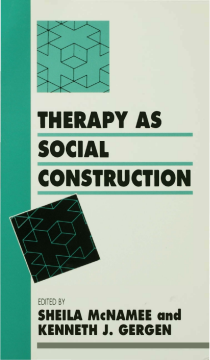
Additional Information
Book Details
Abstract
`An interesting collection of the state of the art of social constructionism and therapy, and a major contribution to reflection on therapeutic theory and practice' - Changes
`The chapters are interesting as windows into wider debates beyond therapy to those within the human sciences over the organization of meaning and change in culture... the value of this book is that it makes it possible for the reader to step back and think that therapy may mean different things to different communities, that therapy is not the touchstone but only one of many social constructions' - British Psychological Society Counselling Psychology Review
This volume explores the exciting possibilities for the therapeutic process of adopting a social constructionist perspective. A key concern is with socially constructed lives. Our senses of self, identity and life purpose are socially and culturally embedded, but no single cultural `script' proves all-powerful. In social constructionist therapy, client and therapist work to co-create new, more satisfactory `stories' in ways which recognise their social, relational character.
The book firstly examines the theoretical basis for this process. It also looks at the implications for client-therapist relationships and discusses various approaches in practice, including `irreverent therapy', the `not-knowing therapist' and the role of reflexivity. A number of case studies are presented. The final section offers an exhilarating mix of overview, self-critique and agenda for the future.
`An interesting collection of the state of the art of social constructionism and therapy, and a major contribution to reflection on therapeutic theory and practice' - Changes
`An important work which propels us into a new era for therapeutic practice. The diverse contributing authors illustrate newer developments in the arena which previously has been promoted as systemic therapy. The current focus moves us away from a constructivist, solipsist epistemology, with its impairing dilemma of neutrality, towards a therapeutic understanding which gains inspiration from the social realm... [The book] offers an elaborate understanding of the significance of the social constructionist epistemology when applied in the therapeutic domain. The volume's essays are well-written and suited for individuals within all areas of the helping professions... reading similar explanations in different "voices" provides a richness of perspective which leads to a complex understanding of the primary aspects of constructionist therapeutic practice... an outstanding work which can be highly recommended' - Nyhedsbrev, Centre for Qualitative Research Newsletter, Denmark
`This book can be read both as a study of reframing, with some extended examples, and as a daring exploration into the foundations of therapy' - Counselling, The Journal of the British Association for Counselling
`The chapters are interesting as windows into wider debates beyond therapy to those within the human sciences over the organization of meaning and change in culture... the value of this book is that it makes it possible for the reader to step back and think that therapy may mean different things to different communities, that therapy is not the touchstone but only one of many social constructions' - British Psychological Society Counselling Psychology Review
`I found reading this book a stimulating experience... it makes some very useful points and I recommend it to anyone who would like to discover a new and interesting model for the therapeutic process' - Clinical Psychology Forum
` of the central themes of this book is the rejection of the therapist as an expert... (with) the emphasis on process and on the mutually enriching and developmental elements inherent in a trusting therapeutic interaction' - Self & Society
`These readings about the application of social constructionism to psychotherapy are unique because the authors reside in a number of different countries and come from a wide range of professional backgrounds. Despite its small size, the books covers a breadth of topics' - Choice
